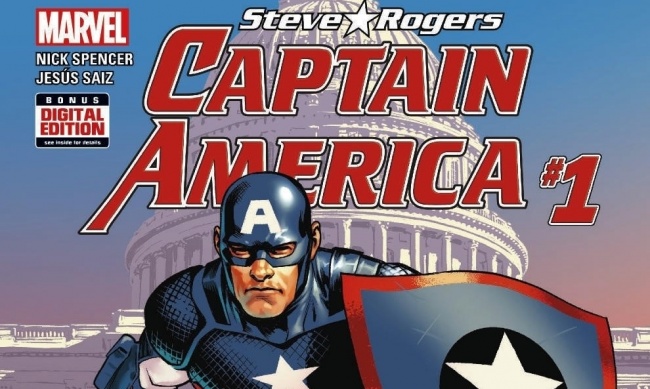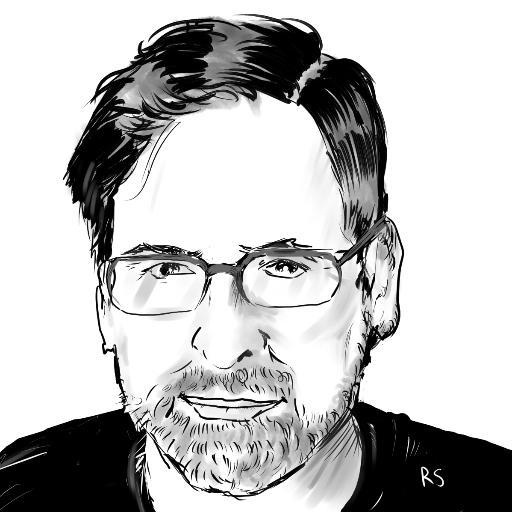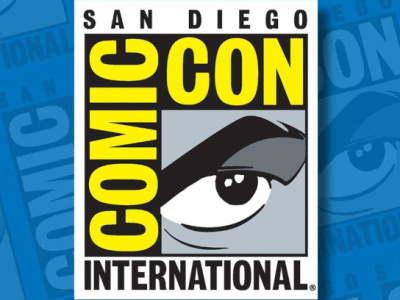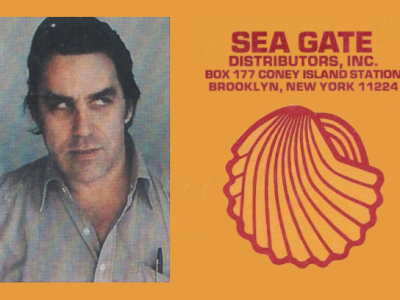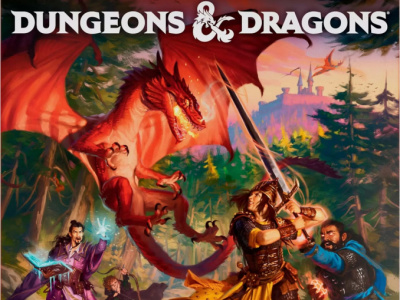Is there a larger problem with Cap’s relationship with HYDRA? Yes, but not the one you’re thinking.
A Stain on the Shield? The criticism of the storyline from Captain America: Steve Rogers #1 has gone in a couple of directions. Some people feel that the story is a manipulative gimmick or a puzzling move to tarnish the Cap brand at the moment of its greatest success ($1B at the box office and counting). Some have used it as an excuse to bash writer Nick Spencer (and, oddly, former Cap writer Ed Brubaker, who had nothing to do with any of this). That’s just the usual give-and-take of the Internet in all its glory.
But there’s a more serious charge being leveled. A strident chorus online objects that suggesting that the all-American Steve Rogers not only is, but always has been (since the 1930s) a member of this sinister and vaguely racist secret society, violates the fundamental basis of Captain America’s character and proverbially spits on the graves of his Jewish creators Joe Simon and Jack Kirby.
Let’s unpack this a bit.
Sympathy for the Devil. Simon and Kirby, like most Jewish Americans in the early 1940s, were strongly anti-Nazi well before America took sides in World War II. Captain America Comics #1, which debuted on the stands half a year before Pearl Harbor, famously featured Cap clocking Hitler on the cover, and S&K received death threats from pro-fascist groups in the US for their trouble.
But interestingly, neither Simon nor Kirby, nor any other Americans at the time, ever expressed any views toward the criminal organization HYDRA. That’s not because HYDRA was a secret society unknown to the public, or that its connections to the Nazi regime had not been revealed.
It’s because HYDRA is make-believe. It’s not real. Whatever it allegedly stands for in the Marvel Universe of 2016, it is a dramatic device that exists exclusively in the story world.
If you want to point to something “problematic” about Captain America’s relationship with fascism, I suggest we start with the larger decision on Marvel’s part to substitute HYDRA for Cap’s traditional foes, the actual historical Nazis.
Simpler stories for simpler times. When I was a kid reading comics in the 1970s, Nazis were still perennial go-to bad guys. Many of the creators were from the World War II generation; others like Roy Thomas and Paul Levitz, who both wrote great Golden Age period stories, were mindful of history even as they overlaid superheroic and fantasy elements. It made me, and probably a lot of other young readers, curious about what actually happened, and even provided a few bedrock facts about the real people and events.
At some point, comics and much of popular culture abandoned this approach. Perhaps Nazis were considered too old and hackneyed to be relevant as villains anymore. Maybe it was suddenly considered in poor taste, after 50 years, to use the powerful imagery of the swastika and the very serious crimes of Nazis as fodder for entertainment, even in roles that acknowledged their heinous activities. Or maybe the whole issue became too “political” for a global brand to be associated with.
Whatever the reasons, the creative decision to complicate the straightforward “American patriot versus evil Nazi” backstory that served Captain America well enough for decades is a much bigger problem for Marvel than the whole “Cap is a sleeper HYDRA agent” gimmick. It rendered Captain America: The First Avenger – an otherwise fine film – nearly unwatchable for me, and calls other aspects of Marvel’s story strategy in both the comics and the movies into question.
Doomed to repeat it? A friend of mine teaches art history at Emory University, one of the top higher education institutions in the country. For a freshman survey course in documentary photography of the 20th Century, one of his lectures concerned photos from the Holocaust. He told me that 48 out of the 50 students in the class did not know what that term referred to. These are 18-19 year olds, mostly from the US, attending a good school, in 2014. It’s not just anecdotal. In 2015, the Anti-Defamation League sponsored a broad international survey on knowledge and attitudes toward the Holocaust and discovered that 54% of the global population had never heard of the Nazi genocide, and only 33% have heard of it and believe it has been accurately described by history (as opposed to exaggerated or distorted, putatively for Zionist-propaganda purposes). Other surveys bear out the fact that the historical memory is fading, especially among the young and poorly-educated – not just overseas, but here in the United States.
Meanwhile, white supremacist ideology is on the march in the US and Western Europe. The stigmas associated with Nazism, fascism and violent nationalism are fading. Anti-Semitism is a resurgent problem in Europe and Asia, among the left as well as the right, even as the causes and consequences of World War II are being forgotten or deliberately undermined.
This is the intellectual environment into which Disney is pumping billions of dollars of popular entertainment that suggests that it was actually a criminal secret society, acting outside of the mechanisms of politics or culture, that infiltrated and used the German government as a front for global domination: entertainment which not only takes liberties with history, but rewrites history to avoid the inconveniences of using actual historical villains as villains, even when they served that role in the comics for decades.
Am I suggesting that some portion of the audience for Captain America might be stupid enough to believe that a fictional conspiratorial secret society, rather than a genuine populist, racist, right-wing movement, was what really caused Germany to commit all those atrocities? Read the polling and make up your own mind about that.
The enemy within. This is why I think the selective outrage about Spencer’s Captain America: Steve Rogers really misses the point. A comic storyline that suggests fascism could come to the United States in the guise of patriotism is, I dare say, not out of place at the current moment.
A fictional universe that propagates confusion about the historical realities of Nazism and World War II? That might have bothered Joe and Jack a little bit more.
The opinions expressed in this column are solely those of the writer, and do not necessarily reflect the views of the editorial staff of ICv2.com.
Rob Salkowitz (@robsalk) is the author of Comic-Con and the Business of Pop Culture.



